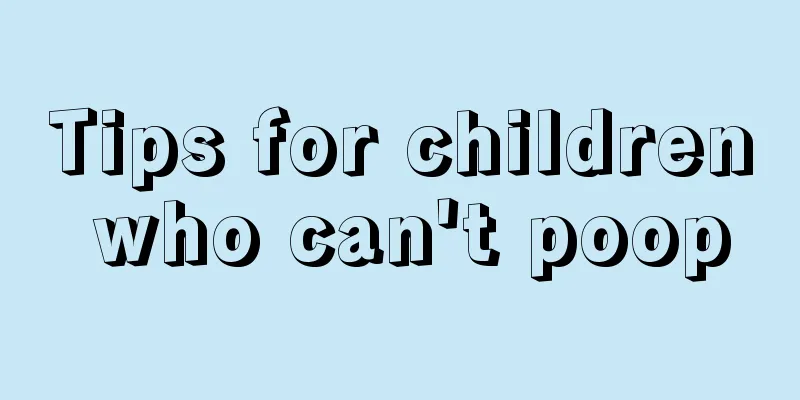What should I pay attention to in my baby’s diet starting from seven months old?

|
Now for many ladies who love beauty, breastfeeding may cause their body deformation, etc., so many mothers are unwilling to breastfeed their babies. Some mothers have to add complementary foods to their babies very early because they do not have enough breast milk. However, you can start adding some complementary foods to your baby from seven months old. At this time, the nutrition of breast milk cannot fully meet the baby's growth needs. Today we will introduce to mothers what they should pay attention to in their baby’s diet starting from seven months old. Although the growth and development of babies aged 7 to 9 months is relatively slower than that of the first six months, the requirements for feeding the baby need to be more meticulous and thoughtful. During this period, although the amount of milk produced by mothers has not decreased, the quality has declined. Therefore, the complementary food added to the baby must meet the baby's growth and development needs. At this time, half of the baby's nutrition will come from complementary food. At this time, you should also purposefully train your baby to move his upper and lower jaws and use the tip of his tongue to press against the upper palate to swallow the food after putting it in his mouth. Starting from 7 months, while ensuring that the baby's daily milk intake remains unchanged, in addition to feeding the baby well-cooked noodles and porridge every day, you can also add some soy products. Of course, vegetable puree, fish puree, liver puree and egg yolk are still indispensable. Start by feeding your baby twice a day, and prepare the amount of each meal according to your baby's situation. It should be about the amount of complementary food you would add to your baby in the early stages of the day, which is about ten teaspoons. The food should also gradually change from a muddy state to a paste-like state, and can be swallowed by the baby after just a few holds in his mouth. The food particles can also gradually become thicker and no longer need to be filtered. The amount of water can also be gradually reduced from 10 times the original main ingredient to 7 times. From the time the baby is 8 months old, the number of feedings can be reduced to three times a day. Since the baby's gastric juice can fully play a role in digesting protein, more protein foods can be added, such as tofu, fish, lean minced meat, dairy products, etc. Starting from 8 months, babies often want to eat by themselves. You need to pay more attention to and give kind guidance, and don’t be afraid that the baby will make a mess. This will quickly cultivate the baby’s interest in food. For a 9-month-old baby, the number of feedings can be reduced to twice a day, and the amount of complementary food should be increased accordingly. You can add some potatoes, sweet potatoes and other root foods with high sugar content, tender vegetables and other crude fiber foods. In order to develop the baby's chewing ability, you can let the baby chew harder food, such as letting the baby hold the food in his hand and chew it. It is best for the baby not to sit on the mother's lap to eat, but to sit in a baby chair to eat food, so that the baby can learn to grab food with his hands and put food into his mouth by himself, so that the baby can learn to eat while playing. At the same time, you should also train your baby to drink water from a cup. I hope today’s introduction can bring some good news to our mothers, allowing them to take more careful care of their baby’s diet, allowing their baby to develop good eating habits, and balancing the nutrition needed by their baby’s body. Let your baby grow up healthy and strong. The baby's stomach is very delicate, and parents are expected to pay attention to the baby's dietary health when adding complementary foods to the baby. |
<<: Why does a 1-year-old baby have white tongue coating?
>>: What to do if your four-month-old baby has phlegm in his throat
Recommend
Symptoms of navel infection in newborns
Newborns have to rely on their own bodies to resi...
What is the stool of a six-month-old baby?
Stool is the excretion of the baby's body. Al...
What is the cause of Selective Disorder Syndrome in children?
Selective mutism, also known as selective mutism,...
Why does my baby have yellow hair?
We all know that hair is black, but many babies h...
Traditional Chinese Medicine Explanation for Hot Palms and Feet in Children
Hot palms and soles of children are a symptom we ...
Eosinophils in children
Alkaliphils are a type of white blood cell that o...
Balance method of bone-derived alkaline phosphatase in children
Bone alkaline phosphatase in children is an indic...
How to treat a ten-month-old baby with poor appetite
Most babies around ten months old have a poor app...
Different causes and differences of convulsions in children
If a child suddenly has involuntary convulsions w...
What is the reason for children blinking frequently?
What is the reason why children blink frequently?...
Are babies afraid of cold or heat?
Whether babies are afraid of cold or heat is not ...
What to do if your child keeps coughing
Coughing is a common phenomenon that occurs in bo...
What to do if your baby is frightened
Babies are easily frightened when they are young....
Treatment of myocarditis in children
Children are in a period of rapid growth and thei...
Can adolescent children grow taller?
Our country's economy continues to develop an...









